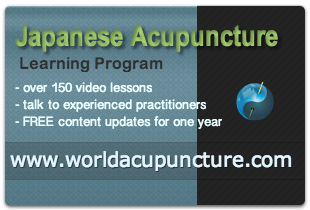Acupuncture education has become an almost totally theoretical system based on rigid textbooks emphasizing point based acupuncture and a very basic set of practical skills.
Did you know that an overwhelming number of graduates disappear from practice within the first 5 years?
Without a deeper understanding of the movement of energy throughout this meridian/organ complex known as a human being our treatments can lack the connectivity and fluidity required to consistently deliver the level of positve treatment outcomes necessary to generate and maintain a prosperous Acupuncture practice.
For many practitioners, Acupuncture is good for pain relief and merely an adjunct to herbal medicine, points are recommended on much the same basis as herbs, in a RECIPE.
There is so much more available for the committed practitioner of Traditional Acupuncture, especially Traditional Japanese Acupuncture!
5 excellent reasons why Traditional Japanese acupuncture can help you to unleash you full potential as an acupuncturist and enjoy ongoing prosperity from your practice:
1. Traditional Japanese acupuncture’s theory base provides an accurate, easily-understood feedback system for your treatments. Every time you treat, you know what worked and what didn’t. You know how accurate your diagnosis is. You know exactly what to try next when your treatments fail. This feedback will help you to grow at an exponential rate.
2. Traditional Japanese acupuncture provides a theoretically deep yet enormously practical perspective on using five element points. These points are the most potent points on the body, and you can learn how to apply them to every situation for fantastic results.
3. Traditional Japanese acupuncture’s skill set is incredibly effective and refined. You will learn a wide range of techniques that will give you enormous flexibility and power in clinic.
4. Done correctly, Traditional Japanese acupuncture is far less painful than conventional TCM acupuncture. With Japanese Acupuncture you can access an enormous and lucrative marketplace of people who are terrified of painful needling technique.
5. Traditional Japanese Acupuncture is particularly effective for stubborn, chronic conditions such as Chronic Fatigue Syndrome and post viral syndromes. These fields are woefully under serviced by both the conventional and complementary medicine industries. Japanese Acupuncture is the final port of call for many chronically exhausted folks.
By embracing the interconnection of the various meridians and their interaction with and interdependency upon the zang-fu/organs Acupuncture treatment takes on a whole new dimension.
As a Traditional Japanese Acupuncture specialist you too could be using one of the most powerful Traditional medicines available on the planet today!
Through your well practiced, skilled hands and theoretical clarity the potential to deliver extra-ordinary treatment outcomes in an extremely gentle manner can become a reality.
In November 2000, after dinner on my 48th birthday, Masakazu Ikeda asked that I do everything possible to ensure the survival of Traditional Acupuncture into the 21century.
I took his request seriously.
Almost 9 years later and I am making an all out effort to share my experience, expertise and passion for the PRACTICE of this ancient healing art globally.
Working with two talented and committed individuals in Adam and Andrew has accelerated the process significantly and I am excited to announce that we are about to launch the long awaited Traditional Japanese Acupuncture educational website http://worldacupuncture.com
For the last 15 years I have allowed willing acupuncture students into my clinic.
As a result they have been able to observe treatments, learn various needling and moxibustion techniques, participate in frequent theoretical and practical workshops, hone their practical skills and have their inevitable and inexhaustible supply of questions answered.
Acupuncture learning opportunities such as this are not commonly available!
Addressing the yawning chasm between Acupuncture education and Acupuncture practice has become a driving passion for me.
Making my clinical experience more freely available to assist those practitioners and students who are willing to practice and study hard to develop their practice is a very high priority.
You are invited to utilize my 25 years in practice to expand your clinical repertoire………….
As a part of the World Acupuncture Community you will:
Be participating in a learning program designed to give you every opportunity to develop your practical skills and expand your understanding of Traditional Acupuncture, allowing you to deliver more effective clinical outcomes for your patient’s and enjoy true prosperity through your practice unlike the 95% of graduates who disappear from practice within the first 5 years.
Get ready to join us on the path to refined skills and great results
Stay tuned, http://www.worldacupuncture.com, is launching soon!
Watch out for some VERY SPECIAL OFFERS exclusively available for the early birds who like to catch the worm !!!!
Alan Jansson is an internationally recognized teacher and practitioner of Traditional Japanese Acupuncture. For well over a decade, independent of and in conjunction with Masakazu Ikeda sensei and Edward Obaidey, Alan has presented, convened and hosted in the vicinity of 30 Traditional Japanese Acupuncture workshops in Australia, New Zealand and USA. Driven by a strong desire to promote the consumer friendly nature, clinical efficacy and potency of Meridian Based Traditional Japanese Acupuncture, Alan is a staunch advocate of practically based workshops and draws upon his 25 years clinical experience and 14 years post and undergraduate teaching in a concerted effort to lift the bar globally in the clinical application of this most amazing medical art.
Join him in Exploring the Art of Acupuncture in the 21st century at http://www.Worldacupunctureblog.com
For more info, please visit: http://www.Worldacupuncture.com

Sounds interesting. I’m curious about the difference between TCM and Japanese approaches.
Thanks for your interest Ken. There are a number of areas of difference in application and theory that I hope will become more obvious as you read some of the posts on this blog.
There are also many similarities.
All the Best,
Alan
To be honest, this is a very interesting & informative post. Never thought that there would be such a gap between TCM & Japanese style treatments.